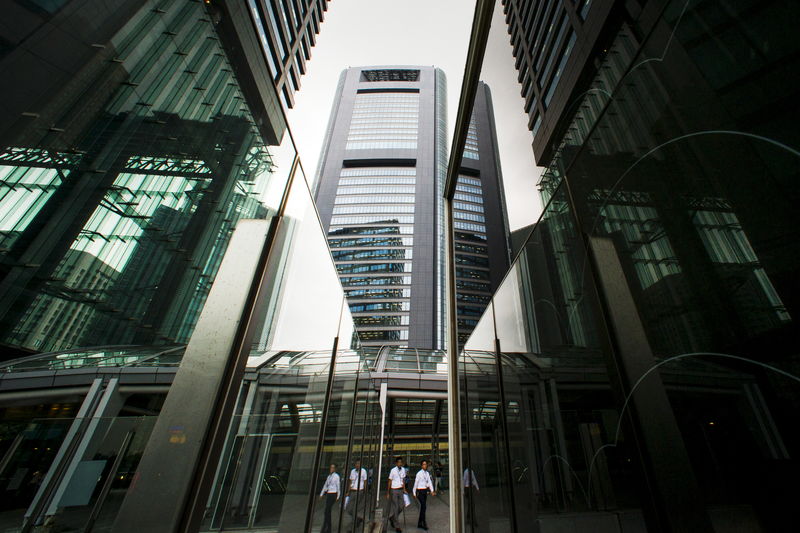By Tetsushi Kajimoto
TOKYO (Reuters) - Japan's economy is likely to stop expanding this year and into next with the Sino-U.S. trade war and a planned sales tax hike expected to crimp activity, a Reuters poll of Japanese companies found, with most calling for fresh stimulus to prop up growth.
The gloomy outlook suggests that Prime Minister Shinzo Abe's reflationary policy mix, known as "Abenomics", is sputtering.
"A combination of the U.S.-China trade friction and the tax hike in October will almost certainly tip Japan into recession," an electric machinery maker wrote in the monthly survey.
The Corporate Survey found 42% of respondents see the economy contracting into next year, while 52% believe growth will remain stagnant. Just 5% foresee it expanding, the June 4-13 poll showed.
China and United States, the world's two largest economies, have been locked in a tit-for-tat tariff war for nearly a year, which has curbed global trade and upended supply chains, pressuring Japan's exports and factory output.
Some 55% of Japanese firms said harsher U.S. punitive tariffs against China were affecting their business profits, with much higher proportions of transport machinery firms and chemicals makers taking a hit, the Reuters Corporate Survey showed.
But only 7% of Japanese firms were considering moving their operational base or supply chains outside of China, suggesting they see the trade spat calming down or are waiting to see how long it lasts. Some 57% said this wasn't something they are considering while 36% said they had no businesses in China.
TAX HIKE
Japanese businesses are also worried that raising the sales tax to 10% from 8% -- to cover rising social welfare costs as the nation rapidly ages -- will undermine consumer spending.
Previously, when the tax rate was raised from 5% in April 2014, it triggered a slump.
To keep the economy from faltering, nearly two-thirds of companies called for fresh stimulus, with a quarter of respondents wanting an individual income tax cut and nearly as many demanding the government postpone the sales tax hike.
The next two most popular choices were investment tax breaks, picked by 22%, and more fiscal spending, picked by 20%.
Only 5% picked further monetary easing as a stimulus option, underscoring a widespread market view that the Bank of Japan's stimulus has done about all it can.
"Additional stimulus is necessary if the sales tax hike goes ahead even as the global economy is in a downtrend," a machinery maker manager wrote in the survey, which collects anonymous comments.
"We must stop a sales tax hike for good, or even cut it to 5% or below," a retailer said.
ALREADY PEAKED
The survey's outlook reinforces the growing view that Japan's economy may already be in recession after having likely peaked out last autumn, said Yasunari Ueno, chief market economist at Mizuho Securities.
Both Ueno and business respondents expressed concerns about a slump in the economy after Japan hosts the summer Olympics next summer.
"As Tokyo Olympics-related capex runs its course, a stronger yen lifted by expectations of Fed rate cuts will add downward pressure on growth," Ueno said. "Moreover, if the sales tax rises to 10% as planned in October, that will hurt consumer sentiment."
The economy has shown signs of slowing since late last year. In the most recent quarter ended in March, it grew at an annual pace of 2.2% but key GDP components - consumption, capex, exports and imports - all slowed sharply from the prior quarter.
Meanwhile, as President Donald Trump demands that the U.S.-Japan trade gap be fixed, nearly two-thirds of Japanese firms saw no need to reduce Japan's trade surplus with the United States, the survey showed.

The survey, conducted for Reuters by Nikkei Research, canvassed 505 big and midsize companies, of which 240-260 companies responded on condition of anonymity.